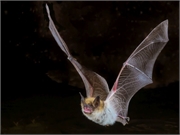- Could Your Grocery Store Meat Be Causing Recurring UTIs?
- Are You Making This Expensive Thermostat Error This Winter?
- Recognizing the Signs of Hypothyroidism
- 10 Strategies to Overcome Insomnia
- Could Artificial Sweeteners Be Aging the Brain Faster?
- Techniques for Soothing Your Nervous System
- Does the Water in Your House Smell Funny? Here’s Why
- Can a Daily Dose of Apple Cider Vinegar Actually Aid Weight Loss?
- 6 Health Beverages That Can Actually Spike Your Blood Sugar
- Treatment Options for Social Anxiety Disorder
Bats and Coronaviruses Go Back Centuries

Bats and coronavirus have been evolving together for millions of years, researchers report.
In a new study, investigators compared different kinds of coronaviruses living in 36 bat species found on islands in the western Indian Ocean and coastal areas of the African nation of Mozambique.
The researchers discovered that 8% of all the bats they tested were carrying a coronavirus and that different groups of bats had their own unique strains of coronavirus.
“We found that there’s a deep evolutionary history between bats and coronaviruses,” said study co-author Steve Goodman, a field biologist at Chicago’s Field Museum.
“Developing a better understanding of how coronaviruses evolved can help us build public health programs in the future,” he explained in a museum news release.
The study was published April 23 in the journal Scientific Reports.
All animals have viruses that live inside them. Bats, and a number of other mammal groups, are natural carriers of coronaviruses. These coronaviruses don’t appear to be harmful to the bats, but they can pose a threat to other animals if they jump between species, the researchers said.
There are a huge number of different coronaviruses, and most aren’t known to infect humans and pose no known threat.
The coronaviruses carried by the three dozen bat species in this study are different from the one that causes COVID-19, but learning about coronaviruses in bats in general may improve understanding of the coronavirus causing the current pandemic, according to the study authors.
The researchers also emphasized that even though bats carry coronaviruses, they shouldn’t be harmed or culled in a misguided attempt to protect human health.
“There’s abundant evidence that bats are important for ecosystem functioning, whether it be for the pollination of flowers, dispersal of fruits, or the consumption of insects, particularly insects that are responsible for transmission of different diseases to humans,” Goodman said.
“The good they do for us outweighs any potential negatives,” he stressed.
More information
The National Foundation for Infectious Diseases has more on coronaviruses.
Source: HealthDay
Copyright © 2026 HealthDay. All rights reserved.










